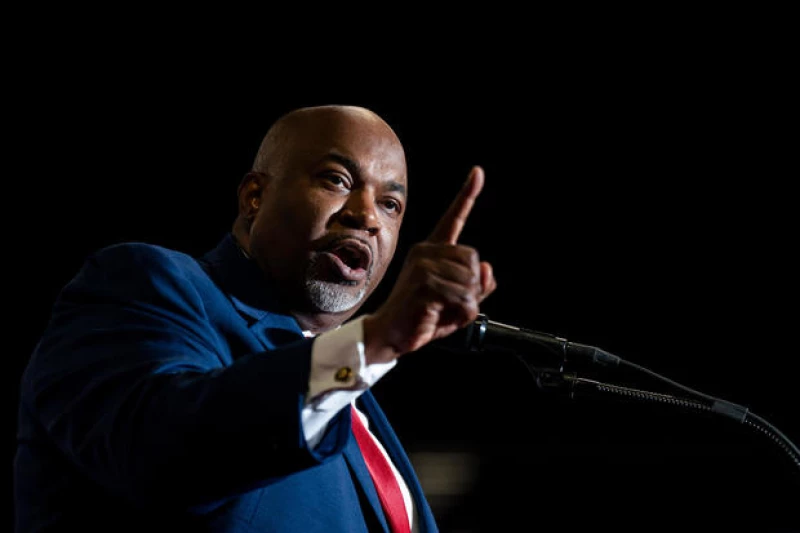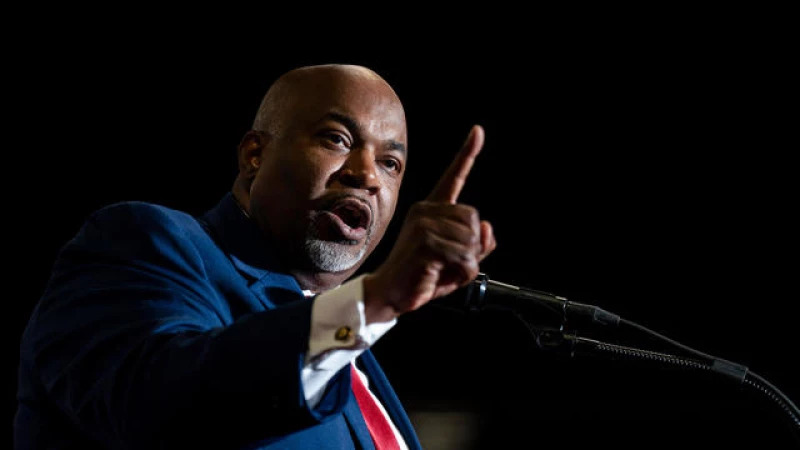Washington — Mark Robinson's controversial remarks have touched on various subjects, with a particular focus on LGBTQ+ issues. During a church service, Robinson expressed his discomfort at the sight of a church displaying a rainbow pride flag, referring to it as "a direct spit in the face of God almighty." He has also stated that children should not be educated about "transgenderism, homosexuality — any of that filth." In addition, Robinson labeled the transgender movement as "demonic" and "full of the spirit of antichrist." Furthermore, he has warned about the perceived escalation of acceptance towards homosexuality, predicting in a Facebook post that "PEDOPHILIA is next," followed by "the END of civilization as we know it."

Mark Robinson, the current lieutenant governor of North Carolina, has stirred controversy with his derogatory comments about Islam. He expressed disappointment that religious freedom applies to Muslims and claimed that "Radical" Muslims "like cuttin' folks into pieces."
Robinson, 55, who previously worked in furniture manufacturing, gained attention after a pro-gun rights speech at a city council meeting went viral and launched his political career. Prior to his election, he had a history of making inflammatory remarks on social media, which he continued to use during public appearances.
One quote that recently circulated out of context was from a 2020 event where Robinson mentioned wanting to go back to a time when women couldn't vote. However, this remark was in response to a question comparing that era to a time of severe racial discrimination, where he clarified that Republicans at that time fought for social change.
Despite this clarification, Robinson has a history of making controversial statements in various settings.
The lieutenant governor has suggested that feminism was created by the devil and equated it to racism. He's also said "it's not your body anymore," fiercely opposing women seeking abortion. He has acknowledged paying for an abortion for his wife before they were married more than 30 years ago, noting it was the "wrong" decision.
He's called climate change research "junk science." And he's openly backed conspiracy theories, saying in a Facebook post in 2017 that he's "seriously skeptical" of John F. Kennedy's assassination and the 9/11 terrorist attacks, suggesting that he distrusted accounts of the events because they were "on television." As lieutenant governor, however, Robinson last September praised "the heroes who ran towards danger, the lives tragically cut short, and the stories of unity that emerged from the rubble."
He's also quoted Hitler, without context. More recently, in the aftermath of Hamas' Oct. 7 attack on Israel, Robinson has been criticized for inflammatory comments he made in the past that are widely seen as minimizing the Holocaust. But he said that although the comments were poorly worded, "there was never any anti-semitism intended from those words, and there's never been any antisemitism within me."
How the rhetoric impacts his campaign remains to be seen. The lieutenant governor's opponents shared some of his comments in advertisements ahead of the nominating contest. But that didn't stop him from earning around two-thirds of the vote in the primary, which came after a key endorsement from former President Donald Trump.
Mark Robinson, who is aiming to become the first Black governor of North Carolina, secured the endorsement of former President Trump just days before the primary election. Trump praised Robinson, referring to him as "Martin Luther King on steroids." Robinson has been criticized for his negative comments about the Civil Rights movement, suggesting that it led to the loss of many freedoms.
The gubernatorial race is anticipated to draw significant attention and funding, as Robinson prepares to go head-to-head with North Carolina Attorney General Josh Stein, a Democrat, in the upcoming November election.
Similar to Robinson's primary rivals, Stein is expected to emphasize the lieutenant governor's controversial statements leading up to the November election. Stein mentioned in a social media post that while many people may have recently become aware of Robinson due to his comments being featured in late-night comedy shows, "for North Carolinians, his rhetoric of hatred and vitriol is no laughing matter — and we must prevent him from winning."
In response to criticisms, Robinson's campaign stated to CBS News that "the Democrats will go to any lengths to tarnish Mark Robinson."
"The real extremist in this race is Josh Stein," remarked Mike Lonergan, the campaign's communications director, alleging that Stein endorses President Biden's "open-borders policies" and is supported by "far-left radicals." "North Carolina voters are fed up with the falsehoods from career politicians like Joe Biden and Josh Stein."
Political Battle in North Carolina
Stein and Robinson are in a heated competition for the gubernatorial post currently held by Gov. Roy Cooper, a term-limited Democrat. Despite the historical success of Democrats in gubernatorial races in North Carolina, voters have leaned towards electing Republicans for other offices in recent years and have consistently voted for Republicans in presidential elections since 2012.
If Robinson secures a win, it could solidify a GOP trifecta in North Carolina, with both chambers of the legislature under Republican control. However, some Republicans, keen on regaining the governor's mansion, have expressed concerns that Robinson's candidacy might pose a risk.
"Robinson does not fit the traditional Republican mold," said Mac McCorkle, a Duke University professor who has served as an issues consultant for political candidates in the state. "He challenges the status quo on a daily basis."
North Carolina is anticipated to be a pivotal battleground state in the upcoming election, especially after the narrow margin of victory Trump secured in 2020. Trump's success in North Carolina seemed to pave the way for Republican wins across the board, except in areas where Democratic candidates were already established. McCorkle highlighted the crucial question this year of whether the candidates below Trump on the ticket could be "so controversial" that they end up harming Trump's chances.
"If voters perceive Robinson as just another Trump-endorsed candidate, that's one scenario," McCorkle explained, pointing out that Trump carried the state in two elections. "However, the intriguing aspect is that, when you delve into their policy stances, Robinson takes a much more extreme position on numerous issues compared to Trump."
Robinson faces a challenging road ahead as he enters the general election phase. Political experts anticipate a shift in his messaging to attract a broader audience in North Carolina.
"It remains to be seen if he can exercise enough self-control to achieve this goal. However, the sheer volume and extremity of his past statements may prove difficult to distance himself from," remarked McCorkle.







